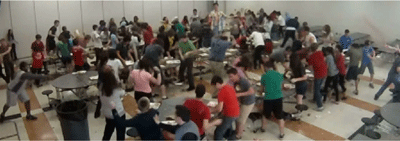Deceased Rock & Roll Hall of Fame musician, singer, songwriter, arranger and producer Prince Rogers Nelson, better known as Prince to his worldwide legions of fans, released his 13-times-Platinum album, Purple Rain in 1984 that contained the number one hit single, “Let’s Go Crazy.” When you hear this song you want to, well, go crazy, let your hair down, holler, shout, let it all hang out.
If you’ve pulled your car alongside a yellow school bus lately or had the occasion to visit a school during lunch period when students are in the cafeteria, the song Let’s Go Crazy will quickly come to mind. The behavior and decorum students are encouraged to observe in the classroom is completely abandoned and students are allowed during those times to literally ‘go crazy.’
It’s not uncommon to observe students in pandemonium mode, screaming, yelling, tussling and agitating bus drivers, tossing food, practicing acrobatics, engaging in skirmishes, and ignoring commands of personnel in cafeterias, and too often insulting and/or assaulting teachers and administrators.
It should surprise no one that people, particularly young people, loudly and boldly use profane language and raucous behavior in public, in anyone’s presence, without concern or compunction that they are insulting anyone or being in any way disrespectful; most wouldn’t care anyway. Some might even ramp up their rowdiness if they suspect you are annoyed.
U.S. President Donald J. Trump, has earned a reputation for behaving badly and has been denigrated for eroding norms of civility in public discourse, and setting a poor example of how public officials— and everyday citizens— should comport themselves.
A wider view of interrelations between strangers in public reveals a continuing deterioration of mutual respect and consideration across the gamut of interactions we routinely engage in as citizens that not only result in minor altercations and interpersonal friction, but neighborhood hostilities, workplace violence and road rage incidents. Americans seemingly have become increasingly predisposed to belligerence in situations that not very long ago were addressed with tolerance and restraint.
The erosion of civility in and among the public seems to have hastened since most school systems dispensed with Civics curriculums a couple of generations ago. There was a time when the core educational programs of most secondary schools included teaching young people their basic rights and responsibility as citizens, including things like free speech and voting, components of government— legislative, executive and judicial branches— and a code of public conduct including standards of behavior for interacting with strangers in public that encouraged treating others as one would prefer to be treated themselves.
Perhaps, reinstituting a Civics curriculum beginning with kindergartners on the first day of school which indoctrinates students with reasonable standards of behavior on school buses, gymnasiums and cafeterias to ensure a measure of self-discipline, respectful interactions with peers and persons in authority, and an understanding of how their individual behavior contributes to the quality— or dysfunction— of their school environment, communities and society at-large might begin to reestablishment cordiality going forward.
To encourage students’ compliance to Civics lessons their cooperation should be rewarded. Their adherence to standards of good civil conduct should earn them ‘educational’ achievements along with English, math and science. If American society will salvage a modicum of civility in our future public discourse, then our children must collectively be taught to be civil.
